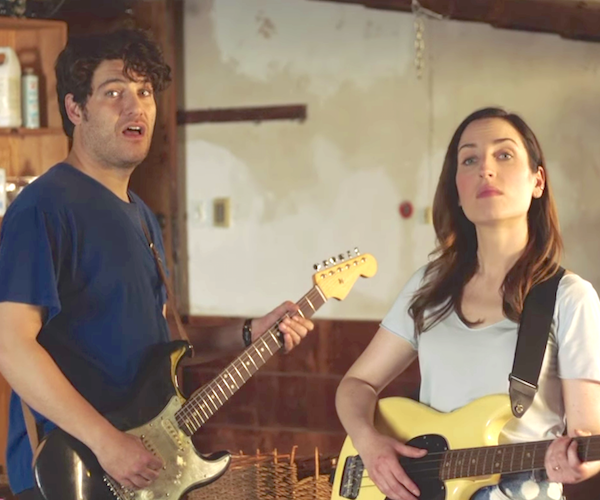Film Interview: A Talk with Writer, Director, and Actor Zoe Lister-Jones
While Band Aid feels authentic in its realistic depiction of contemporary relationships, its humor is consistently disarming.

Adam Pally and Zoe Lister-Jones in “Band Aid.”
By Tim Jackson
For actress, writer, and director Zoe Lister-Jones, Band Aid is a film (opening today at Coolidge Corner Theatre) she has been waiting to make. She jokingly calls its premise — the plot revolves around a couple who work out their disagreements through songs in a rock band — “thereoke.” It all happened organically, she says. In real life she sings with her husband and, on occasion, they sang out their spats together. So, she thought, “wouldn’t it be fun to see a couple learn to fight through song?”
Between the ages of 16 and 21 she toured New York in a band “with a bunch of older guys.” Then with Kyle Forester, who composed music for Band Aid, she did a recording of pop and rap cover songs as piano ballads. Up until then she had considered herself primarily a lyricist. She has written all the lyrics for an earlier relationship film entitled Breaking Upwards, which she starred in with her husband, Daryl Wein, who also directed. In Band Aid she began playing around with instruments, strapping on a bass guitar.
Band Aid, she explains, looks at “gender relations in a heterosexual relationship through a female lens.” In fact, the key crew members were all women. The film doesn’t push a feminist agenda, but the result is an unusually open and emotionally resonant look at modern relationships, one that reflects the new openness between men and women explored in a number of other contemporary films, from the contributions to the so-called Mumblecorps genre to the raw relationships in Judd Apatow produced films and Lena Dunham’s Girls series.
To her credit, Lister-Jones has come up with a directing style in Band Aid that feels raw and honest. An invaluable assist came from finding the right co-star in Adam Pally, star of Happy Endings and The Mindy Project, who has been described by contemporaries as a “go-to bro” (he even hosts an online series called Game Of Bros – Frat Competition). “Oh, that’s the guy, I thought after meeting him,” she recalls. “It never felt like acting. The chemistry is excellent, and great chemistry makes viewers feel voyeuristic. There’s a spontaneity in my relationship with Adam. Our rehearsals set that tone.”
I asked Lister-Jones, the writer, director, and star, if it was difficult staying true to her initial vision: “To keep that dynamic alive throughout the shoot we shot with two cameras so as not to have to re-do spontaneous moments. I had my editor do two or three cuts a day so I could decide what worked as we went along. I needed to feel confident all through the shooting — I didn’t want any surprises. Then we developed a rough cut and tested it in screenings. The final cut was viewed with friends and family.” When asked if her character in Band Aid was based on herself, Lister-Jones says “the character is me, but stripping away some of the comedy layers I’d developed doing TV sit-coms (Living in Pieces). I think actors always infuse characters with personal characteristics.”
While the final product feels authentic in its realistic depiction of contemporary relationships, its humor is consistently disarming. The writing is sharp, aided by some smart casting, which includes Colin Hanks as ‘Uber Douche,’ and Brooklyn Decker, Jamie Chung, and Erinn Hayes as the three girl ‘friends’ of the drummer, Dave, a recovering sex addict played by Fred Armison. “It was a big challenge,” confesses Lister-Jones, “trying to keep a straight face with Fred on the set.”
Tim Jackson was an assistant professor of Digital Film and Video for 20 years. His music career in Boston began in the 1970s and includes some 20 groups, recordings, national and international tours, and contributions to film soundtracks. He studied theater and English as an undergraduate, and has also has worked helter skelter as an actor and member of SAG and AFTRA since the 1980s. He has directed three feature documentaries: Chaos and Order: Making American Theater about the American Repertory Theater; Radical Jesters, which profiles the practices of 11 interventionist artists and agit-prop performance groups; When Things Go Wrong: The Robin Lane Story, and the short film The American Gurner. He is a member of the Boston Society of Film Critics. You can read more of his work on his blog.
